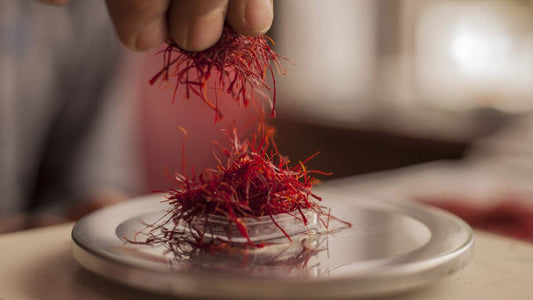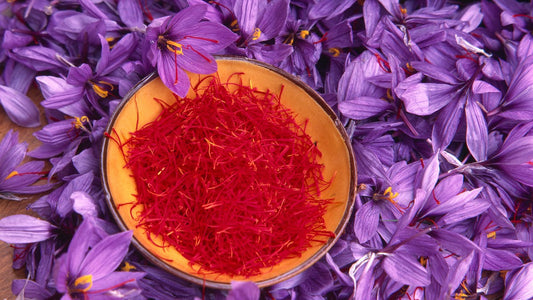
The Antiviral Properties of Saffron: Nature’s Golden Shield
Ara OhanianShare
Saffron, often referred to as “red gold,” is renowned for its culinary and medicinal properties. This precious spice, derived from the Crocus sativus flower, has been a staple in traditional medicine for centuries. Recent scientific research has unveiled saffron’s impressive antiviral properties, positioning it as a natural remedy in the fight against viral infections. In this comprehensive guide, we delve into the antiviral benefits of saffron, exploring its active compounds, mechanisms of action, and potential applications in modern medicine.
Understanding Saffron: A Brief Overview
Saffron is prized for its vibrant color, distinct aroma, and unique flavor. The spice is harvested from the stigmas of the Crocus sativus flower, which are carefully hand-picked and dried. Each flower produces only three stigmas, making saffron one of the most labor-intensive and expensive spices in the world.
Key Compounds in Saffron
The medicinal properties of saffron can be attributed to its bioactive compounds, primarily:
1. Crocin: Responsible for saffron’s rich color and exhibits potent antioxidant and anti-inflammatory properties.
2. Safranal: Contributes to saffron’s distinctive aroma and has demonstrated neuroprotective and mood-enhancing effects.
3. Picrocrocin: Imparts the unique bitter taste and possesses antimicrobial properties.
The Antiviral Mechanisms of Saffron
Saffron’s antiviral properties are a result of its complex biochemical composition. The spice exerts its antiviral effects through multiple pathways:
1. Inhibition of Viral Replication: Saffron’s active compounds interfere with the replication cycle of viruses, preventing their proliferation within the host.
2. Immune Modulation: Saffron enhances the body’s immune response, aiding in the detection and elimination of viral pathogens.
3. Anti-Inflammatory Effects: By reducing inflammation, saffron helps mitigate the symptoms associated with viral infections, such as swelling and pain.
Scientific Evidence Supporting Saffron’s Antiviral Properties
Numerous studies have investigated the antiviral potential of saffron and its constituents. Here are some notable findings:
1. Herpes Simplex Virus (HSV): Research has shown that crocin, one of saffron’s primary compounds, can inhibit the replication of HSV, reducing the severity and duration of outbreaks.
2. Influenza: Studies suggest that saffron extracts can enhance the effectiveness of conventional antiviral drugs against influenza viruses, offering a synergistic effect.
3. Human Immunodeficiency Virus (HIV): Preliminary research indicates that saffron may have a role in inhibiting the activity of HIV, potentially slowing the progression of the disease.
Practical Applications of Saffron in Antiviral Therapy
Saffron can be incorporated into various forms of treatment to harness its antiviral benefits:
1. Dietary Supplementation: Consuming saffron as a supplement can boost overall health and strengthen the immune system.
2. Topical Applications: Saffron-infused creams and ointments can be used to treat skin infections caused by viruses like HSV.
3. Integrative Medicine: Combining saffron with other antiviral herbs and conventional treatments can enhance therapeutic outcomes.
Saffron in Traditional Medicine: A Historical Perspective
Saffron’s use in traditional medicine dates back to ancient civilizations, including the Greeks, Egyptians, and Persians. Historical texts document its use in treating a variety of ailments, from respiratory infections to gastrointestinal issues. Modern science is now validating these age-old remedies, highlighting saffron’s relevance in contemporary healthcare.
Dosage and Safety Considerations
While saffron is generally safe for consumption, it is important to adhere to recommended dosages to avoid potential side effects. The optimal dosage may vary depending on the form of saffron used and the specific health condition being treated. It is advisable to consult with a healthcare professional before incorporating saffron into your regimen, especially if you are pregnant, breastfeeding, or taking other medications.
Future Directions in Saffron Research
The promising results of current studies pave the way for further research into saffron’s antiviral properties. Future studies should focus on:
1. Clinical Trials: Conducting large-scale clinical trials to confirm the efficacy and safety of saffron in treating viral infections.
2. Mechanistic Studies: Investigating the precise molecular mechanisms through which saffron exerts its antiviral effects.
3. Synergistic Effects: Exploring the potential synergistic effects of saffron with other natural and pharmaceutical antiviral agents.
Conclusion
Saffron’s antiviral properties offer a compelling case for its inclusion in the arsenal of natural antiviral agents. As research continues to uncover the full potential of this golden spice, it may soon become a cornerstone in the prevention and treatment of viral infections. Incorporating saffron into your diet and healthcare routine could provide a natural, effective means of bolstering your body’s defenses against viruses.
FAQ: The Antiviral Properties of Saffron
What are the main antiviral compounds in saffron? Saffron’s antiviral properties are primarily due to its bioactive compounds: crocin, safranal, and picrocrocin.
How does saffron inhibit viral infections? Saffron interferes with viral replication, enhances immune response, and reduces inflammation.
Which viruses can saffron help combat? Research shows saffron may be effective against herpes simplex virus (HSV), influenza, and potentially HIV.
How can saffron be used for antiviral purposes? Saffron can be consumed as a dietary supplement, applied topically in creams, or used in integrative medicine.
Is saffron safe for everyone to use? Saffron is generally safe, but it’s important to follow recommended dosages and consult with a healthcare professional, especially for pregnant or breastfeeding women and those on medications.
What future research is needed for saffron’s antiviral properties? Future research should focus on large-scale clinical trials, detailed mechanistic studies, and exploring synergistic effects with other antiviral agents.




